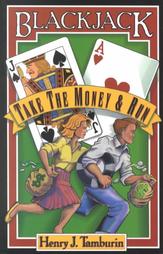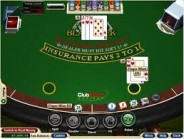
Blackjack: Take The Money and Run
Blackjack Advice - Who Can You Trust?
I was enjoying myself playing and winning at blackjack when a young lady took a seat next to me. It was obvious after a few hands that she didn't have a clue as to how to play the game so she Henry Tamburin is the editor and publisher of the Blackjack Insider Newsletter and author of the best-selling Blackjack: Take the Money & Run. He is also the lead Instructor for the Golden Touch Blackjack course, a feature writer for Casino Player magazine (and 6 other publications); an owner of a casino gambling publishing company (www.rsucasinobooks.com) and the host of www.smartgaming.com. For a free three month subscription to the Henry's Blackjack Insider Newsletter with full membership privileges go to www.bjinsider.com/free. Henry's website is www.smartgaming.com boldly asked the young dealer for "advice" on how to play her hands. I sat there in amazement as the dealer was instructing her on how to play her hand. What disturbed me most was that better than half of the advice that he gave her was wrong. Her bankroll rapidly evaporated as she continued to make terrible plays at the advice of the "expert dealer".
Henry Tamburin is the editor and publisher of the Blackjack Insider Newsletter and author of the best-selling Blackjack: Take the Money & Run. He is also the lead Instructor for the Golden Touch Blackjack course, a feature writer for Casino Player magazine (and 6 other publications); an owner of a casino gambling publishing company (www.rsucasinobooks.com) and the host of www.smartgaming.com. For a free three month subscription to the Henry's Blackjack Insider Newsletter with full membership privileges go to www.bjinsider.com/free. Henry's website is www.smartgaming.com boldly asked the young dealer for "advice" on how to play her hands. I sat there in amazement as the dealer was instructing her on how to play her hand. What disturbed me most was that better than half of the advice that he gave her was wrong. Her bankroll rapidly evaporated as she continued to make terrible plays at the advice of the "expert dealer".
I have no grudges to bear against casino dealers. They have a very tough and demanding job. But dealers are trained to deal the cards and the vast majority of them have no knowledge of winning blackjack play.
I mentioned the above recent incident because in fact I've witnessed an increase in the number of players asking dealers for help on how to play their hands. For some reason blackjack players believe that if a person deals the game, that person must be an expert on how to play the hands. This, unfortunately is not true. Most dealers that I've observed know very little about basic strategy and nothing about card counting. Telling players to insure their blackjack hands and never to split a pair of 8's when their upcard is a 10 is simply wrong advice.
The policy in most casinos forbid dealers from advising players whether to hit, stand, double down, or pair split. This is for security reasons to prevent any possibility of a dealer and his player friend taking advantage of the casino. However, when novice players openly ask the dealer for advice, they usually respond with a suggested strategy. Often, it's an incorrect strategy.
Dealers aren't the only ones giving misinformation about blackjack playing strategies. I recently picked up a newsletter that was in the racks in a casino that offered "helpful hints for table game players from the grand institute of fun and games professor." On blackjack the advice was:
4. Don't take a hit on a possible bust hand (12 or higher) if the dealer's upcard is a 6 or less
5. If you lose more than five times in a row, move to a different table, don't fight the cards
The first piece of advice is wrong. For every $100 you bet holding a pair of 8's vs a dealer ten upcard, you will on average, gain $5 more by splitting rather than hitting. Standing on a pair of 8's vs a dealer ten value card is an even worse strategy. The bottom line is that a pair of 8's is a bad hand. You should always split 8's against any dealer upcard to get a fair chance at some winning hands. Against a dealer's upcard of 3 to 7 you will usually convert a losing hand into a winning hand by splitting the 8's. In the case of a dealer's upcard of 2, 8, 9, 10 or ace, you will probably lose by splitting, but you lose less.
Always split aces is sound advice. But to double down on two card combinations of 9,10 and 11 is nonsense unless you specify against which dealer's upcard. The fact of the matter is that you should only double down on two card combinations of 9 if the dealer's upcard is 3,4,5,6. If the dealer has any other upcard you should never double down. Likewise, you should double down on two card combinations of 10 only if dealer's upcard is 2 thru 9 and double down on 11 only against dealer's upcard of 2 thru 10. The above is the mathematically correct doubling strategies for 4, 6 or 8 deck games (with single or double deck games, the doubling strategy is slightly different).
The casino newsletter advises to not take a hit on a possible bust hand (12 or higher) if the dealer's upcard is a 6 or less. The mathematically correct play when you hold a 12 against a dealer's upcard of 2 or 3 is to hit. Although this is a close play, the percentages are still in the favor of hitting 12 on dealer's 2 or 3 and standing on 12 against dealer 4,5 or 6.
The point I want to make is that players should not rely on casino generated publications or the advice of dealers to learn blackjack playing strategies. If you have to ask a dealer how to play your hand, then you don't belong on the blackjack table. There are plenty of good books, instructional videos, even hand held basic strategy cards that you can take with you on the tables that will give you correct strategies on every hand. It’s the smart way to play blackjack.

